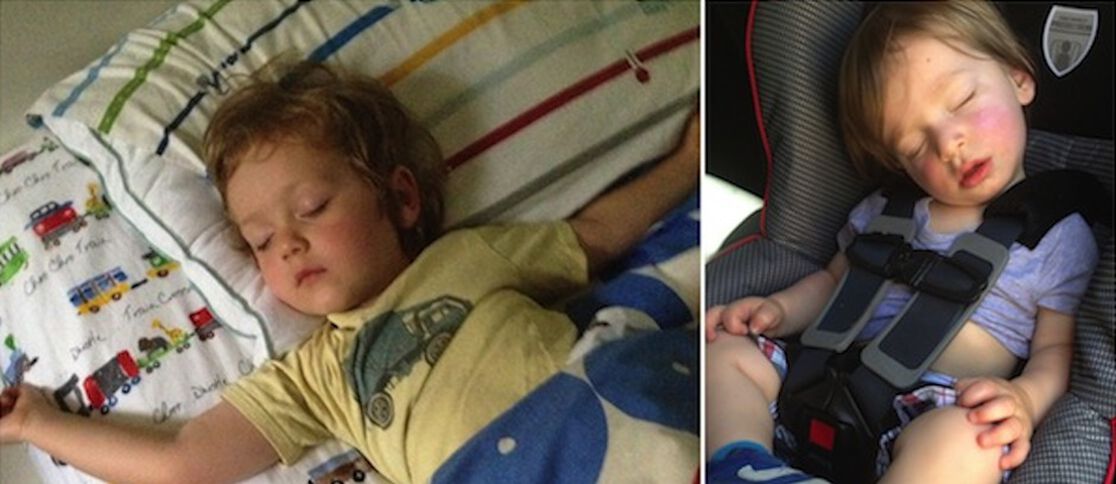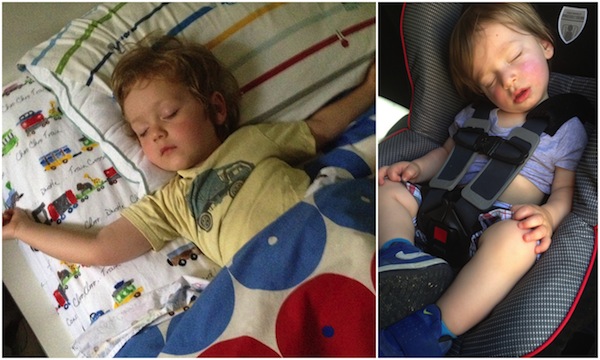Summer time is a great time to head out on a long anticipated family vacation. But, once you have little ones, travel is never quite the same. A long plane or car ride, new environment, different time zones, and sleeping arrangements are all variables that affect your little one’s routine and sleep schedule. Good news, with a little pre-vacation guidance, you can prepare for these changes well in advance.
I remember the first time my husband and I took a family trip. Our daughter was one-year-old, and we went to New York City. Traveling across the country from California to NYC definitely sparked our parenting jitters. We had just transitioned our daughter to one nap and an earlier bedtime. We worried about how disrupted our lives would become by choosing to take such a long vacation. To help alleviate our worries, we reached out to pediatric sleep consultant, Angelique Millette. With her help and guidance, we prepared weeks in advance for our trip so that sleep disruptions and jet-lag were minimal upon our arrival.
Below are some of the wonderful tips Angelique shared with us:
• Before your trip, place your infant in her portable travel crib for sleeping so she gets used to the new sleep space. You can do this for naps or nights or both.
• Bring your infant's lovey, sleep sack (light and heavy weight), unwashed crib sheet (familiar scent), and sound machine. Bring your toddler's blankies, stuffed animals, favorite bedtime books and pajamas. This will help your infant to feel more secure in a new place and have reminders of home while away.
• Talk to your young child about traveling. If flying for the first time, talk to your child ahead of travel day and tell her about flying in an airplane. Bring along her favorite books, 1-2 new toys and favorite snacks/sippy cup.
• Try to schedule a flight or car trip during nap time or around your child's bedtime.
• If flying, for take off and landing, plan to help your child drink some liquid. Offer breast or bottle for an infant, and a sippy cup with water or juice for older children. This will help to equalize the pressure in the middle ear.
• Some toddlers may not do well with new surroundings and may resist going to sleep or may be scared by new surroundings and faces. Try to help your toddler get used to a new sleep space by spending time together in the new room before bedtime.
• Try spending an additional 10-15 min with your child at bedtime the first few nights. This will mean that you want to start bedtime a little earlier than you normally would at home.
• If taking a long driving trip, pack a travel potty for your newly potty trained toddler. That way you won't ever be too far away from a toilet.
• If your infant or child sleeps better in a dark room or tends to wake up early with the morning light, bring plastic garbage bags or dark fabric and tape over windows.
• If possible, schedule a few relaxing and restful vacation days in between busy, activity-packed vacation days. This is especially helpful after a busy travel day and right before a busy travel day.
~ Juli Fraga, Psy.D.
Dr. Juli Fraga is a psychologist in San Francisco. She specializes in reproductive and perinatal health and wellness. She has written for Design Mom, The Conversation on Lifetime, and PsychCentral. Follow her at www.drjulifraga.com or on Twitter @dr_fraga.
This post is solely for informational purposes. It is not intended nor implied to be a substitute for medical advice. Before undertaking any course of treatment or dietary changes, you should seek the advice of your physician or other health care provider.
We aim to provide you with the most honest and credible information possible. This article was reviewed for accuracy by The Honest Team and was written based on sources that are linked at the bottom of the article.
blog_review_statement




